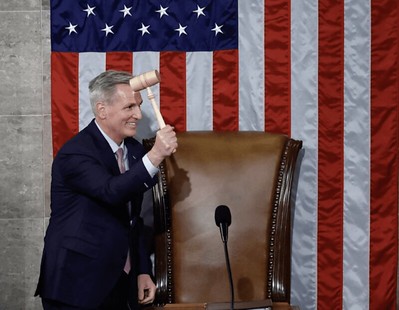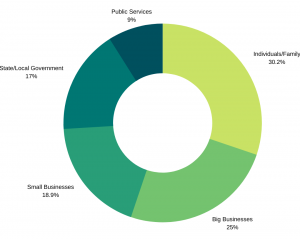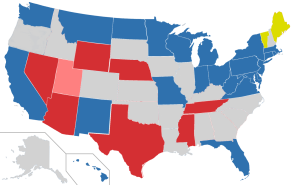It is time to see some bipartisan action in Congress

free use//
Kevin McCarthy wins the Speakership after earning the 216 votes needed.
February 7, 2023
On Jan. 7, GOP leader Kevin McCarthy was elected to be speaker of the 118th Congress. Speaker McCarthy finally clinched the position after four days and 15 rounds of voting and opposition from his own party.
“My ultimate responsibility is not to my party, my conference or even our Congress. My responsibility, our responsibility, is to our country,” McCarthy stated in his victory speech to the House.
Even before he claimed his Speakership, McCarthy’s battle for the position highlighted the glaring divide in the Republican party. 20 Republicans including Matt Gaetz of Florida and Lauren Boebert of Colorado were firm in their decision not to vote for McCarthy because he represented the status quo in Congress.
Jeanne Scheppach, an AP Government and AP U.S. History teacher, said, “There is a group of those that are in the Republican Party that are aligned more with the former President’s agenda in order to push their way into this new Congress to not be forgotten among the [mainstream Republicans]. They wanted to make sure that their voice wasn’t drowned out.”
By the 15th round, there remained six Republicans who did not vote for McCarthy, four of which voted for other representatives and two voting “present,” which let McCarthy win the Speakership with 216 votes with the help of negotiations made with his party that could weaken the role of the Speaker.
The negotiations he made with the 20 Republicans, who are also part of the Freedom Caucus, resulted in them gaining more power by grabbing the seats on the House Rules Committee, changing rules if needed to remove the Speaker, and making headway on restraining government spending.
But that day was just a glimpse of what is in the future: Republicans not coming together because of failure of their demands being met, Democrats and Republicans disagreeing with each other on the content of a bill and an overall Congressional mess, leading to an increase in delays to get bills passed.
This is just the start of the many issues that McCarthy will have to face in his new role. With a fractured party and a divided Congress, how will he successfully lead in the future?
Representing California’s 20th District and being from Bakersfield, California, McCarthy is what you could call a typical conservative Republican: small business owner, supporter of limited government, believer of having fiscal responsibility.
Though being from a big and liberal state like California, McCarthy has the ability to see the other side as he was surrounded by a diversity of thought in California, especially since his family aligned with the Democratic Party. With McCarthy being the only one in his family to be a Republican, he has worked with numerous Congressmen and has had experience of being a Speaker for 5 years. His long-term background in the political sphere can let him be a mediator between Democrats and Republicans as he has commonalities with both parties.
While McCarthy has a history of criticizing the Democrats, he can use his position to bring light on many issues that the country faces such as immigration, healthcare and government spending in general.
Disagreements in Congress are common, but almost always they are for political attention to further their agenda. For the American people, they have been accustomed to the representatives’ inaction, and with each polarizing topic, they become less hopeful for the future.
“All bills need to be passed by a majority vote so if the bill is structured [in a way that] doesn’t appeal to that one branch of the Republicans … it will definitely make things difficult, but they can always go back and depend on … concessions that are made to favor all parts of the Republican party, not just mainstream Republicans,” Scheppach said.
The way our Congress functions affects Americans. As they become more divided through their political views, Congress should be the leader to show us how both parties can come together to pass effective legislation.
Too often Congress members can’t seem to see past their ideological differences and compromise on the issues at hand, and the country has faced consequences because of it. Even though the problem of the political system isn’t specific to just our country, it would show great leadership if political leaders showed effort in wanting to work toward a common cause.
With Speaker McCarthy now being the leader of the House, second in line to the president’s succession, it is important for him to show how he can unite the parties, despite the deep-rooted differences they might have.



